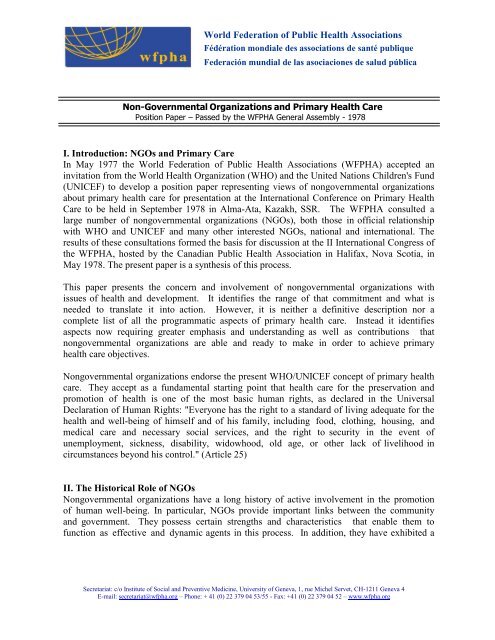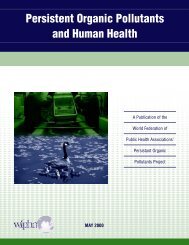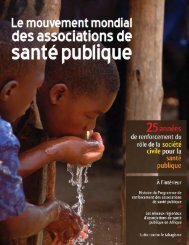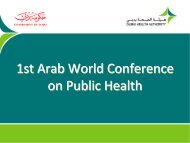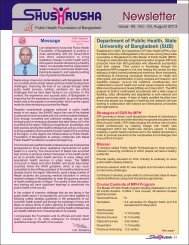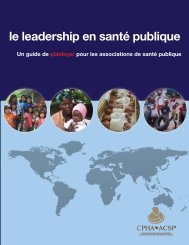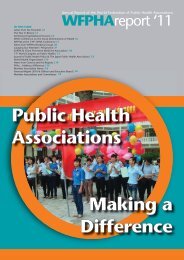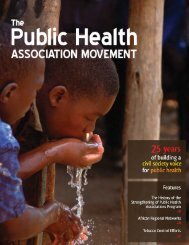Non-Governmental Organizations and Primary Health Care - World ...
Non-Governmental Organizations and Primary Health Care - World ...
Non-Governmental Organizations and Primary Health Care - World ...
You also want an ePaper? Increase the reach of your titles
YUMPU automatically turns print PDFs into web optimized ePapers that Google loves.
<strong>World</strong> Federation of Public <strong>Health</strong> AssociationsFédération mondiale des associations de santé publiqueFederación mundial de las asociaciones de salud públicaspecial capacity to work within the community in response to expressed needs. They havea flexibility <strong>and</strong> freedom to respond in innovative <strong>and</strong> creative ways to a wide range ofrequests <strong>and</strong> situations.Their programs, ranging from research to community-based projects, cover the wide spectrumof human concerns <strong>and</strong> often pioneer in the fields of health <strong>and</strong> development. NGOsinclude the strictly professional, specialized, <strong>and</strong> technical organizations; broadly-basedassociations of persons or groups organized for a particular purpose (e.g., information <strong>and</strong>service activities, educational institutions <strong>and</strong> associations, social welfare organizations,religious groups, women's organizations, youth groups, trade unions, family planningassociations, etc.); <strong>and</strong> agencies engaged in various types of self-help economic <strong>and</strong> socialdevelopment programs. Many are linked to international federations or associations.In most countries, there are national <strong>and</strong>/or local citizens' movements, self-help groups,cooperatives, <strong>and</strong> other associations, some organized on a tribal or ethnic basis, others to meetspecial needs. In the field of health, NGOs have long helped to set st<strong>and</strong>ards for practice,training, <strong>and</strong> continuing education <strong>and</strong> to define the role of health workers in nationalprograms. Others have concentrated on a particular disease or activity (e.g. cardiovasculardiseases, leprosy, tuberculosis, programs for the disabled, etc…).The diverse programs <strong>and</strong> competencies of numerous organizations, not directly involved inhealth care, also contribute in one way or another to total human development. Theyinclude projects to improve nutrition, food production, <strong>and</strong> housing; provide safe water;promote literacy; provide educational <strong>and</strong> other instructional materials; further communitydevelopment; provide training in a broad range of skills; protect the environment; etc. In short,they are helping to create conditions conducive to the protection, promotion, <strong>and</strong> maintenanceof health <strong>and</strong> the prevention of illness.Recent years have seen a growing capacity of nongovernmental organizations to developpatterns of cooperation among themselves locally, nationally, <strong>and</strong> internationally, forconsultation <strong>and</strong> exchange of information, or for joint action.III. <strong>Primary</strong> <strong>Health</strong> <strong>Care</strong> <strong>and</strong> Development1. Integrated Human Development<strong>Non</strong>governmental organizations support the view that the promotion of primary health caremust be closely tied to a concern for total human development. The totality of hum<strong>and</strong>evelopment <strong>and</strong>, in fact, a holistic view of health encompasses the physical, mental, social,<strong>and</strong> spiritual well-being of the individual. III-health comes to rich <strong>and</strong> poor alike. However,much ill-health is a result of poverty <strong>and</strong> in itself is a serious barrier to breaking out of theSecretariat: c/o Institute of Social <strong>and</strong> Preventive Medicine, University of Geneva, 1, rue Michel Servet, CH-1211 Geneva 4E-mail: secretariat@wfpha.org – Phone: + 41 (0) 22 379 04 53/55 - Fax: +41 (0) 22 379 04 52 – www.wfpha.org
<strong>World</strong> Federation of Public <strong>Health</strong> AssociationsFédération mondiale des associations de santé publiqueFederación mundial de las asociaciones de salud públicabondage of poverty. Thus substantial improvements in the well- being of people cannot beexpected merely as a result of better health care, but requires a whole range of social,economic, political, <strong>and</strong> cultural activities, i.e., primary health care must be an integral part ofthe overall development of society.Human development cannot be fragmented. Social <strong>and</strong> economic factors are closelyinterrelated <strong>and</strong> interdependent. It is not enough, for example, to disseminate health <strong>and</strong>nutrition education if l<strong>and</strong> tenure <strong>and</strong> utilization preclude the production of adequate food forlocal consumption. It is futile to promote a health insurance scheme if employmentopportunities are so limited that participation is beyond the reach of many. Provision of asource of clean water to a community will have an impact on water-borne diseases only insofaras the community is educated in its use <strong>and</strong> management.2. Community ParticipationThe integrated approach to human development embodies a concern for "people rather thanmerely "economic growth." It takes into account the needs <strong>and</strong> aspirations of the population<strong>and</strong> aims at providing the community with the means to promote its own well-being <strong>and</strong> toparticipate in its own health care. All factors that improve the quality of life must beintegrated <strong>and</strong> made available. Meeting community needs is the basis for the design <strong>and</strong>implementation of any primary health activity. It calls for the involvement of communitymembers at all stages of planning <strong>and</strong> implementation of such activities <strong>and</strong>, in satisfyingthose needs, promotes a confidence within the community for further involvement indevelopment activities. Initiation of health care services often provides the opening wedgefor a broader approach to community development. Efforts to secure the fullest possibleparticipation of the community in all aspects of this process are dictated not merely byconsiderations of economy <strong>and</strong> efficiency but by the conviction that this is an enhancement ofthe individual, a necessary part of achieving a basic human right which is presentlyunattainable in conditions of poverty. Where the patterns of poverty, dependence, <strong>and</strong>marginalization are engrained, a motivational process is needed to create awareness in thosewho believe there can be no change; that possibilities in fact do exist for change.There are several approaches to health care <strong>and</strong> none is universally applicable. The appropriateform of primary health care will vary with the differing needs of the community. Thereshould be a rational balance among the curative, preventive, promotive, <strong>and</strong> rehabilitativecomponents. Education of the community is essential for maximum use of the "primary"approach <strong>and</strong> for increasing the responsibility of individual families for their own health care,such as well-informed self-medication <strong>and</strong> modification of life-styles.Ample opportunities for a self-sustaining style of health care can be realized by relating thehealth care system to other community development programs, such as fishing <strong>and</strong> farmingSecretariat: c/o Institute of Social <strong>and</strong> Preventive Medicine, University of Geneva, 1, rue Michel Servet, CH-1211 Geneva 4E-mail: secretariat@wfpha.org – Phone: + 41 (0) 22 379 04 53/55 - Fax: +41 (0) 22 379 04 52 – www.wfpha.org
<strong>World</strong> Federation of Public <strong>Health</strong> AssociationsFédération mondiale des associations de santé publiqueFederación mundial de las asociaciones de salud públicacooperatives, credit unions, <strong>and</strong> insurance schemes. Over-financing of primary health care is asserious a problem as under- financing. It tends to create unsustainable structures <strong>and</strong>institutions, <strong>and</strong> to reinforce patterns of dependency. Levels of external assistance must beappropriately limited in order to promote the self- reliant use of local resources.IV. What NGOs Can Do1. At all stages in the development of primary health care programs, NGOs can be effective.Recognition by government of the contributions NGOs can make in support of primary healthcare will ensure maximum benefits of these contributions to the national health program.2. NGOs can work for greater underst<strong>and</strong>ing <strong>and</strong> positive attitudes toward primary health careby: (a) promoting dialogue both within <strong>and</strong> among NGOs;(b) sustaining dialogue with governmental authorities;(c) providing information <strong>and</strong> creating new ways of explaining primary health care to thegeneral public; <strong>and</strong>(d) strengthening means of communication to accomplish this.3. NGOs can assist national policy formation in the areas of health care <strong>and</strong> integrated hum<strong>and</strong>evelopment. They can present health care needs based on their contacts with communities,<strong>and</strong> they can also interpret primary health care plans to relevant donor agencies.4. NGOs can establish means for greater collaboration <strong>and</strong> coordination of primary health careactivities. This can be done among NGOs <strong>and</strong> between them <strong>and</strong> governments, locally,nationally, <strong>and</strong> internationally.5. NGOs can contribute to primary health care in many ways through program implementation.They can:(a) provide assistance to develop <strong>and</strong>/or strengthen local NGO capabilities <strong>and</strong> activitieswith particular attention to local community development groups;(b) conduct reviews <strong>and</strong> assessment of existing health <strong>and</strong> development programs <strong>and</strong>assist communities in the exercise of their own role in such reviews; a greater emphasison evaluative techniques will render all new programs more accountable to realcommunity needs;(c) develop innovative programs placing primary health care in the context ofcomprehensive human development;(d) ensure that their existing programs <strong>and</strong> new initiatives promote full participation byindividuals <strong>and</strong> communities in the planning, implementation, <strong>and</strong> control of theseprograms;(e) exp<strong>and</strong> their training efforts to respond to the needs of primary health care programs,Secretariat: c/o Institute of Social <strong>and</strong> Preventive Medicine, University of Geneva, 1, rue Michel Servet, CH-1211 Geneva 4E-mail: secretariat@wfpha.org – Phone: + 41 (0) 22 379 04 53/55 - Fax: +41 (0) 22 379 04 52 – www.wfpha.org
<strong>World</strong> Federation of Public <strong>Health</strong> AssociationsFédération mondiale des associations de santé publiqueFederación mundial de las asociaciones de salud públicae.g., training of health workers, supervisors, administrators, planners, <strong>and</strong> variousagricultural <strong>and</strong> development workers; included would be training schemes which build onthe skills of traditional healers <strong>and</strong> midwives;(f) extend their efforts to develop locally sustainable <strong>and</strong> appropriate health technologies<strong>and</strong> use of resources, with particular attention to energy, water, agriculture, sanitation, <strong>and</strong>medical care;(g) contribute to the creation of new <strong>and</strong> effective methods of health education whichenable both individuals <strong>and</strong> communities to assume greater responsibility for their ownhealth;(h) recognize the essential role of women in health promotion <strong>and</strong> in the full range ofcommunity development concerns;(i) further extend their capacity to work with poor, disadvantaged, <strong>and</strong> remote populations,enabling them to break the cycle of deprivation <strong>and</strong> in this way contribute to the search forgreater social justice.Secretariat: c/o Institute of Social <strong>and</strong> Preventive Medicine, University of Geneva, 1, rue Michel Servet, CH-1211 Geneva 4E-mail: secretariat@wfpha.org – Phone: + 41 (0) 22 379 04 53/55 - Fax: +41 (0) 22 379 04 52 – www.wfpha.org


